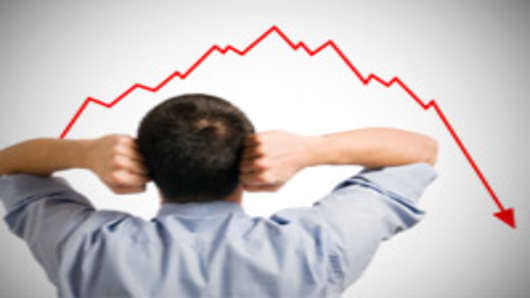Fear has been stalking global markets for the better part of a month, sending stocks across the world lower and the DAX in Germany into bear market territory. The question facing every investor on the planet is simple enough: When will this sell-off come to an end? Because when it does, the risk-on trade will mean big returns.
“It may well be too early to fade the fear, but it seems to us that the recent lunge for safety will eventually be viewed as a buying opportunity for those who look beyond the most recent disturbing data print,” said Michael Gavin, the head of emerging markets strategy at Barclays Capital in New York, in a note to clients on Monday.
For market sentiment to turn around significantly, Gavin predicts investors will need to see a big improvement in US economic data.
“The recent market downdraft probably reflects a mixture of fear and depression (in investor sentiment), but we think there is enough fear in the mix to hold out the possibility of a significant improvement in market tone in the months to come,” said Gavin.
If the recent sell-off is not based solely on fear and the data confirms the worst fears of the market in the third quarter then, "depression," as Gavin puts it, could mean that risk aversion remains the dominant trade of the second half of the year.
The data that really spooked the market last week was the huge fall in the Philly Fed Index. The drop of nearly 34 points in the headline index to -30.7 percent was the biggest drop in measure of economic confidence since October 2008, one month after the fall of Lehman Brothers.
At least one analyst, though, believes that number needs to be taken with a grain of salt and not seen as a clear sign the US is heading into recession , as Dallas Fed Governor Richard Fischer told CNBC last week.
The “Philly Fed Index was undoubtedly grist to the mill of all those, who think that the recession in the US has already begun, or is about to start soon,” said Unicredit’s Chief US economist Harm Bandholz.
Having watched the Philly Fed data closely, however, Bandholz believes the index is now being driven by the stock market, not the economy.
“It seems as if the formerly very tight correlation between the Philly Fed Index and measures of economic activity broke down in early 2010,” he said.
Instead of being driven by the economy, Bandholz said the drop in confidence was driven by the volatility on Wall Street and the financial capitals of the world.
“The latest plunge in the Philly Fed Index largely/primarily reflects the overall deterioration in the mood of companies due to lower stock prices and not the fact that the economy is falling off a cliff,” he said.
There is clearly a lot to be worried about at the moment, though.
“There is political risk almost wherever you look, the US economy will be weak until housing markets normalize, fiscal and monetary 'policy puts' are no longer very convincing, the European debt crisis could go very badly wrong, and even if it does not, investors' anxiety that it might create tensions in global banking systems that further undermine the world economy,” said Gavin who believes none of these problems is guaranteed to go wrong.



